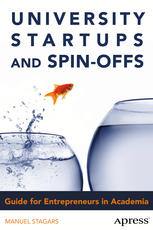

Most ebook files are in PDF format, so you can easily read them using various software such as Foxit Reader or directly on the Google Chrome browser.
Some ebook files are released by publishers in other formats such as .awz, .mobi, .epub, .fb2, etc. You may need to install specific software to read these formats on mobile/PC, such as Calibre.
Please read the tutorial at this link: https://ebookbell.com/faq
We offer FREE conversion to the popular formats you request; however, this may take some time. Therefore, right after payment, please email us, and we will try to provide the service as quickly as possible.
For some exceptional file formats or broken links (if any), please refrain from opening any disputes. Instead, email us first, and we will try to assist within a maximum of 6 hours.
EbookBell Team

4.0
6 reviewsUniversity Startups and Spin-Offs teaches university students, researchers, and educators the most effective strategies and tactics for launching their own startups from academic platforms with the backing of school programs, public grants, incubators, seed accelerators, and private partnerships in all parts of the world.
Serial entrepreneur Manuel Stagars advises students, faculty, and researchers how to test their ideas for marketability, how to develop commercial products out of research projects, and how to engage companies and investors with attractive value propositions. The author has seventeen years of experience as startup entrepreneur, founder of seven companies in the United States, Europe, and Japan, consultant to universities on commercializing their research programs, angel investor, and startup mentor. Stagars’ advice is field-tested, battle-hardened, and supported with a wealth of instructive first-hand examples from his international experience.
The author advises academic entrepreneurs to take matters into their own hands instead of relying on the initiative and support of universities and governments. He shows students and researchers how to fit lean startup methods to their existing university ecosystems, leveraging their strengths without getting bogged down in bureaucratic morass. Avoiding theory and jargon, the book focuses on real-world situations, practical steps, checklists, and case studies. University students and researchers will learn the skills they need to become startup entrepreneurs on an academic platform.
The final part of University Startups and Spin-Offs addresses university administrators, educators, technology licensing officers, incubator managers, and government grant officers. It shows them with practical examples from the private and academic sectors how to integrate startups into the fabric of the university, develop a thriving entrepreneurial ecosystem for students and researchers, leverage latent network effects, build bridges between scientific research and industries seeking innovative solutions, enhance the public image of the university, and motivate the university’s best and brightest to engage in startup enterprises that will deliver benefits to the university and the public as well as to themselves.